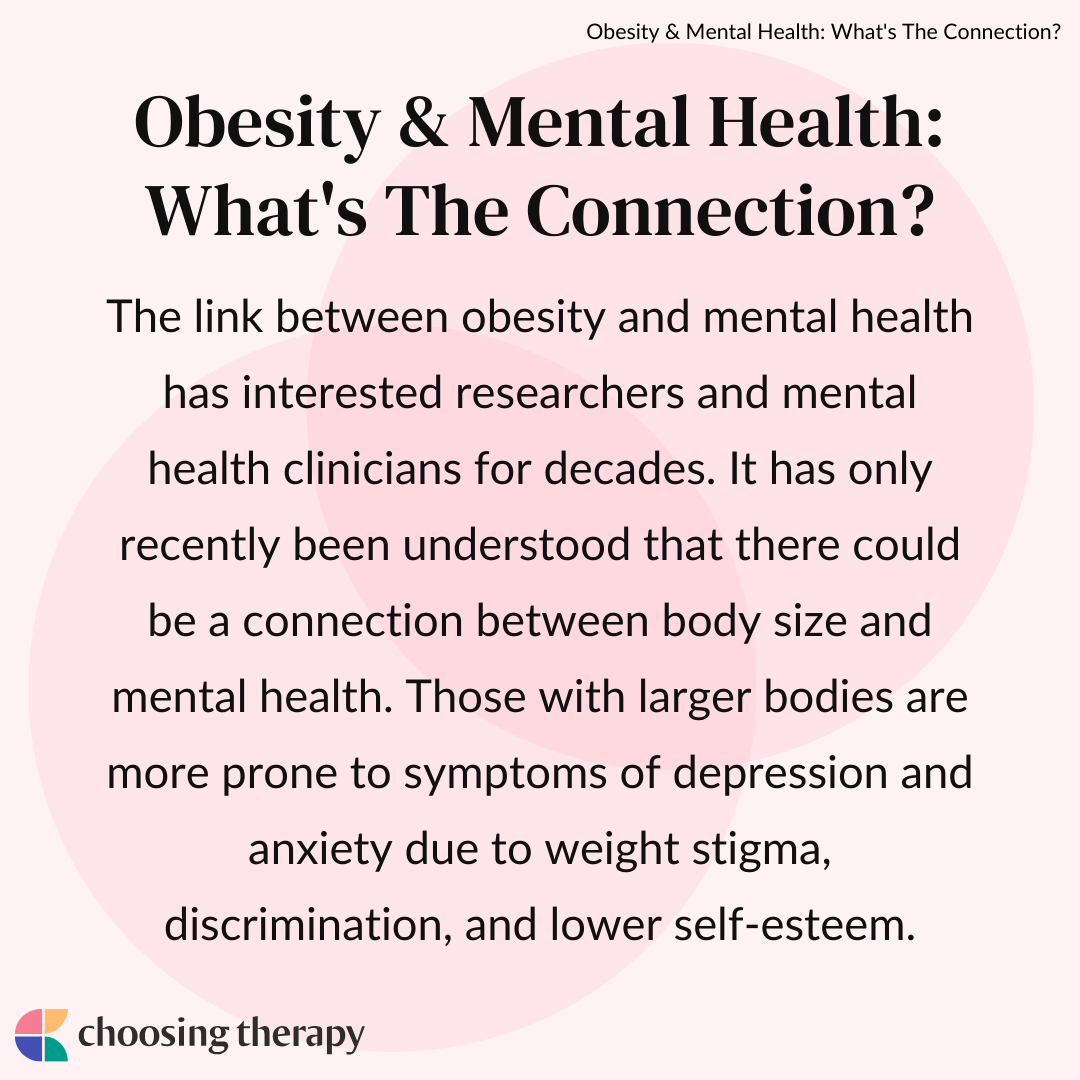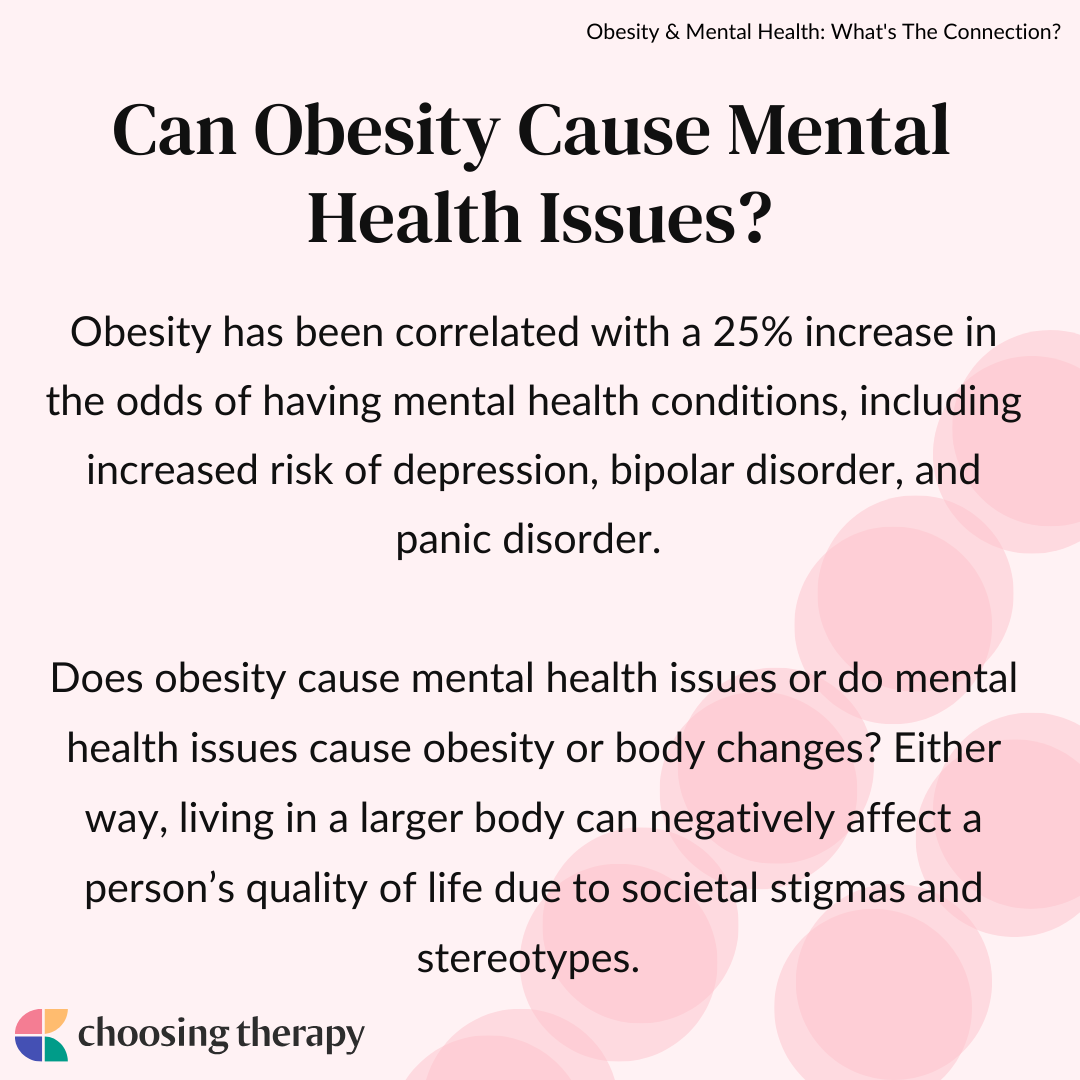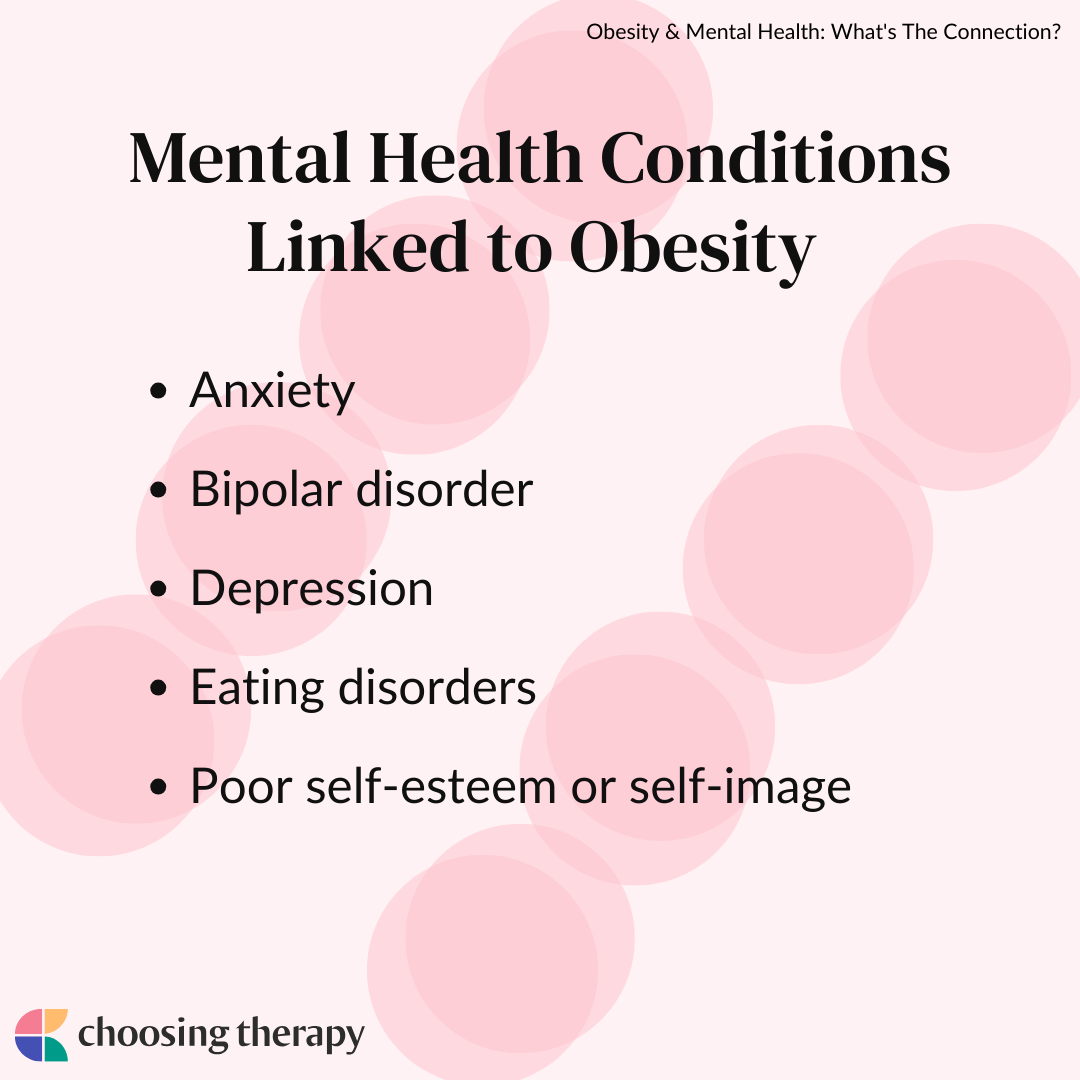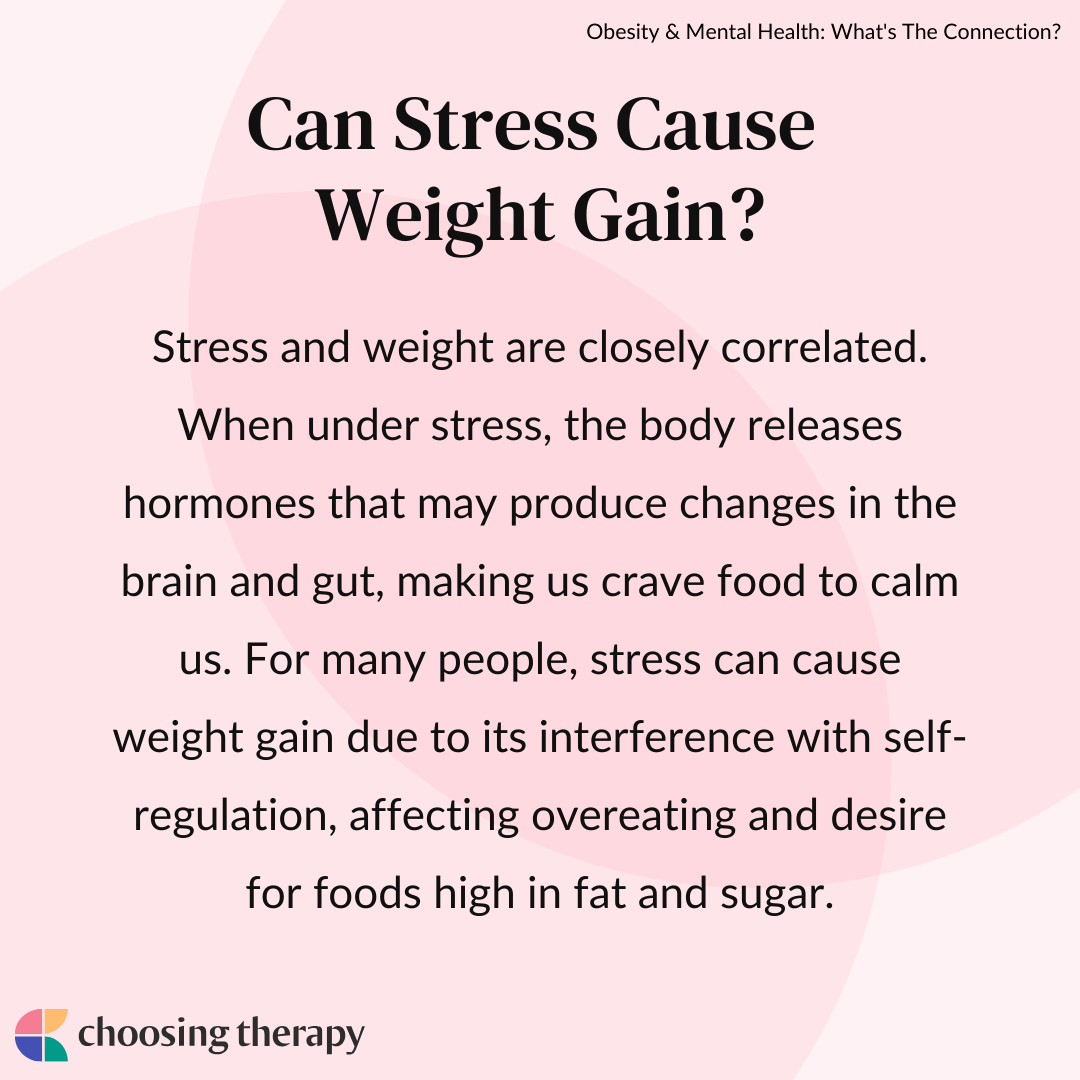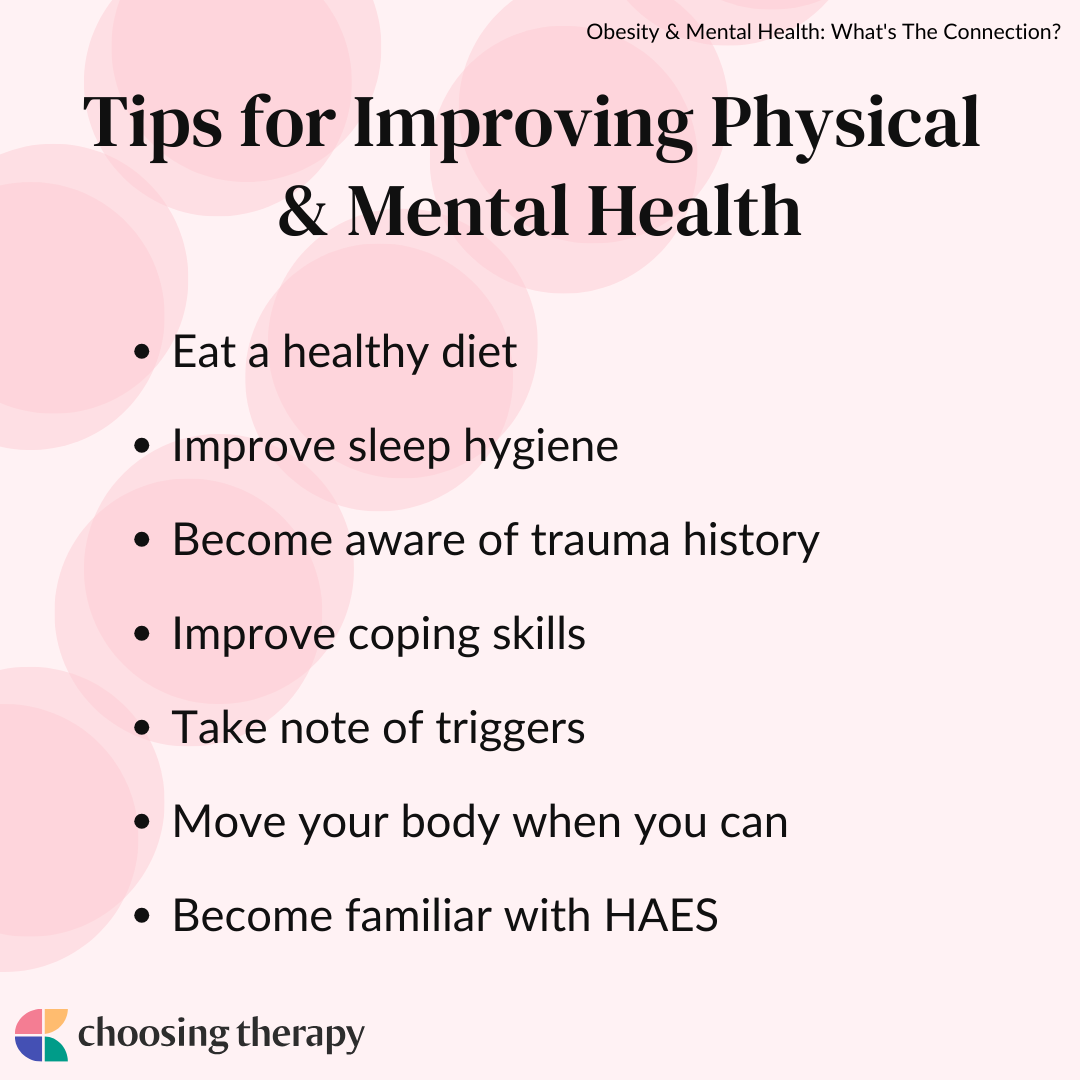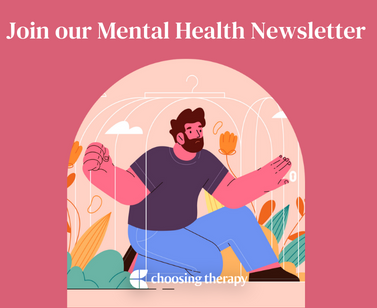The link between obesity and mental health has interested researchers and mental health clinicians for decades. It has only recently been understood that there could be a connection between body size and mental health. Those with larger bodies are more prone to symptoms of depression and anxiety due to weight stigma, discrimination, and lower self-esteem.
A therapist can help you build confidence and self-esteem. BetterHelp has over 20,000 licensed therapists who provide convenient and affordable online therapy. BetterHelp starts at $65 per week. Take a Free Online Assessment and get matched with the right therapist for you.
What Is Obesity?
Obesity refers to a medically based idea of what someone’s weight should be based on their height and other factors. Obesity is having a body mass index, or BMI, over 30.1
While not a mental health issue, obesity is generally understood as a medical issue or disease, largely due to the health complications of increased body fat.1
Can Obesity Cause Mental Health Issues?
Many researchers and medical professionals feel that obesity is correlated with mental health issues. Notably, obesity has been correlated with a 25% increase in the odds of having mental health conditions, including increased risk of depression, bipolar disorder, and panic disorder.2
However, it is interesting to explore whether obesity causes mental health issues or whether mental health issues cause obesity or body changes. Either way, living in a larger body can negatively affect a person’s quality of life due to societal stigmas and stereotypes. “People living with obesity face substantial bias and stigma, which contribute to increased morbidity and mortality independent of weight or body mass index.”1
Emotional Effects of Obesity
People with larger bodies face many hurdles in life, much more so than those with smaller, more socially-acceptable body types. Stigma, judgment, fat shaming, and society’s negative attitudes toward obese people can greatly contribute to mental health issues such as low self esteem, negative body image, and other negative symptoms.
Some common discriminatory beliefs about people with larger body sizes include:
- Laziness
- Irresponsible
- Undesirable
- Are at fault for, or in control of, their body size
- They do not exercise
- Are at fault for high healthcare costs or health concerns in the USA
- They do not eat healthy foods
- They have no willpower
- They overeat
The Link Between Obesity & Mental Health
Being in a larger body or experiencing obesity can affect mental health. While stigma and biases affect people of all genders, they can affect women more than men due to our culture’s obsession with female bodies, which puts additional pressure and stigma on female-identifying individuals.
Mental health conditions linked to obesity include:
Anxiety
Obesity and anxiety disorders are often co-occurring.3 Often, the stigmas and ongoing discrimination associated with being overweight can contribute to feelings of discomfort around others, especially in medical settings. These uncomfortable feelings can lead to feelings of discomfort and anxiety.
Bipolar Disorder
People with bipolar disorder are more likely to be obese or overweight than those without this mental health condition.1 This is likely due to treatment-related factors such as medications and side effects, as well as the history of the individual with bipolar disorder.4
Depression
Obesity and depression are closely linked.3 However, researchers disagree over whether depression causes weight gain or whether it is the weight gain that can cause depression. Many antidepressants can cause side effects of weight gain, which can understandably increase depression that was already present. Therefore, it is likely that both can affect each other.
Eating Disorders
Obesity and eating disorders are closely linked. Although some people who are overweight do not have disordered eating patterns, many who are obese have a pattern of overeating to cope with trauma history or due to the rewards gained from eating palatable foods.
However, while many in larger bodies have eating disorders, it is important to understand that eating disorders and body size are separate. Obese people are often assumed to have binge eating disorder, but they can just as likely have anorexia or any other eating disorder, or no eating disorder at all. People of all sizes can have a range of different eating disorders.
Poor Self-Esteem or Self-Image
Understandably, having a larger body is often associated with poor self-esteem, poor self-image, and decreased self-confidence. Often, these negative feelings come from messages in society, especially for younger people who want to fit in with their peers.
Getting Therapy Is Affordable! BetterHelp – Online Therapy Starting At $65 Per Week “BetterHelp is an online therapy platform that quickly connects you with a licensed counselor or therapist and earned 4 out of 5 stars.” Visit BetterHelp Talkspace - Online Therapy With or Without Insurance Talkspace accepts many insurance plans including Optum, Cigna, and Aetna. Typical co-pay is $30, but often less. Visit Talkspace
Poor Nutrition & Mental Health
There is a link between poor nutrition and mental health. “We know that good nutrition is associated with better mental health outcomes, whereas a poor diet is associated with a greater risk of depression and anxiety.”5
“Both obesity and severe mental illness decrease quality of life and are associated with an increase in disability, morbidity, and mortality, and when they occur together, these adverse health outcomes are magnified.”6
Here are some of the potential signs of poor nutrition a healthcare provider may observe:
- Wounds healing slowly
- Frequent aches and pains
- Low mood
- Poor medication compliance
- Hair and skin appear dull or splotchy
- Clothes are too tight or too loose
- Frequent changes in weight
Can Stress Cause Weight Gain?
Stress and weight are closely correlated. When under stress, the body releases hormones that may produce changes in the brain and gut, making us crave food to calm us. For many people, stress can cause weight gain due to its interference with self-regulation, affecting overeating and desire for foods high in fat and sugar.7
Experiencing chronic stress can also lead to a decline in physical activity and difficulty sleeping during stressful periods, which can also contribute to weight gain.7
Tips for Improving Physical & Mental Health
It only takes small changes to improve physical and mental health. Movement is important, both for improving mood but also for maintaining physical health. If exercise is intimidating or difficult, focus on a 10-minute walk or brief stretching. The key to using movement and exercise is to maintain consistency.8
Here are some lifestyle changes you can make to improve your well-being:
Eat a Healthy Diet
Eating a diet rich in processed foods and red meat has increased one’s chances of negative moods or mental health conditions. Several foods may help relieve depression symptoms.9 However, consuming foods rich in healthy fats and oils and consuming vegetables, fruits, and fish with low fats and antioxidants has been correlated with a lower risk of developing depression or other mental health concerns.9
Improve Sleep Hygiene
Sleep hygiene refers to how one prepares for and maintains good sleep practices. Practicing good sleep hygiene can improve mental health issues by decreasing symptoms of mental health that would otherwise be exacerbated by poor sleep. In turn, decreasing mental health symptoms can help reduce obesity due to improvements in medication efficacy and body functioning.
Become Aware of Trauma History
Because there is a link between trauma and disordered eating,10 likely, those who are overweight due to eating more calories than their body needs are using food to cope. Awareness of one’s trauma history, or their likelihood to self-soothe with food, can be important in improving physical and mental health.
Improve Coping Skills
Maintaining effective coping skills can be a crucial part of improving well-being. Coping skills are techniques to help balance or decrease stress or other negative emotions.
Take Note of Triggers
Self-awareness is an important part of mental health. Awareness of any triggers that may negatively affect your mental health symptoms is an important part of staying physically and mentally healthy.
Move Your Body When You Can
Even just a few minutes a day can help improve your mood. There is a positive link between exercise and depression. Researchers in 2022 found that moving your body for as little as 10 minutes daily can decrease depression symptoms.2 Take the dog outside for a walk or even walk around the outlet mall for a little while to get some movement and sunshine.
Focus on moving in comfortable and enjoyable ways rather than trying to complete exercises you think you “should” be doing.
Become Familiar With HAES
HAES, or Health At Every Size, is essential to improving any mental health symptoms related to weight. HAES seeks to improve health without having weight loss be the ultimate goal. HAES promotes the acceptance and understanding of diverse body types and seeks to improve health for all, regardless of their body size. HAES medical and mental health interventions have been linked to improved diet, eating, and mental health.11
When to Seek Professional Help for Obesity & Mental Health Issues
Being overweight or obese does not necessarily mean that you should find a therapist, as there is nothing wrong with having a large body. However, if you are struggling with obesity and mental health issues, you could consider finding a therapist specializing in body image and weight stigma.
If you want to visit a doctor about weight challenges, find a provider who practices Health At Every Size, or HAES. It is easier than ever to find mental health or self-esteem support. Look for an online therapist directory or online therapy platform for a therapist who can help, or even check out some group therapy or support groups.
In My Experience
As someone in a larger body, this impacts my life in ways that do not affect my thinner peers. The most significant way I notice is when interacting with healthcare professionals, particularly medical doctors, who assume that every ailment I present with can be solved by losing weight. A lot of stigma is associated with people with larger bodies, including assumptions that they do not know about caloric intake and the benefits of exercise. I know about the benefits of exercise, and I engage in conscious movement when able, as I notice improvements in my mental health on days when I can exercise.
To help our readers take the next step in their mental health journey, Choosing Therapy has partnered with leaders in mental health and wellness. Choosing Therapy is compensated for marketing by the companies included below. Online Therapy BetterHelp Get support and guidance from a licensed therapist. BetterHelp has over 20,000 therapists who provide convenient and affordable online therapy. Complete a brief questionnaire and get matched with the right therapist for you. Get Started Virtual Psychiatry Hims / Hers If you’re living with anxiety or depression, finding the right medication match may make all the difference. Connect with a licensed healthcare provider in just 12 – 48 hours. Explore FDA-approved treatment options and get free shipping, if prescribed. No insurance required. Get Started Reduce Drinking Sunnyside Want to drink less? Sunnyside helps you ease into mindful drinking at your own pace. Think lifestyle change, not a fad diet. Develop new daily routines, so you maintain your new habits for life. Take a 3 Minute Quiz Mental Health Newsletter A free newsletter from Choosing Therapy for those interested in mental health issues and fighting the stigma. Get helpful tips and the latest information. Sign UpAdditional Resources
For Further Reading
Online Anxiety Test A few questions from Talkiatry can help you understand your symptoms and give you a recommendation for what to do next. How Does ERP Help With Intrusive Thoughts? Obsessive compulsive disorder (OCD) is a psychiatric condition marked by the presence of obsessive thoughts, images, doubts, or urges, followed by compulsive behaviors or acts aimed at easing the distress caused by the obsession. While the content of the obsessions can take many forms, they are always repetitive, persistent, involuntary, and intrusive, and they often result in a great deal of anxiety for the person experiencing them.




